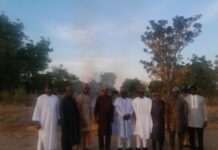 Health expert, Dr Iorhen Akase, has urged the Federal Government to update and publicise the case definition of Ebola Virus Disease (EVD) to aid early identification of cases in Nigeria.
Health expert, Dr Iorhen Akase, has urged the Federal Government to update and publicise the case definition of Ebola Virus Disease (EVD) to aid early identification of cases in Nigeria.
Akase, also the Head, Infectious Diseases Unit, Department of Medicine, Lagos University Teaching Hospital (LUTH), Idi-Araba, Lagos, made the plea in an interview with the News Agency of Nigeria (NAN) on Wednesday in Lagos.
The World Health Organisation (WHO) had announced an outbreak of Ebola Virus Disease (EVD) in Democratic Republic of Congo and Guinea on Feb. 7 and 14, respectively.
Guinea has so far recorded up to 10 suspected cases of Ebola and five deaths since declaring the outbreak on Feb.14.
Ebola Virus Disease (EVD) is a rare, but severe, often fatal illness in humans.
The virus was transmitted to people from wild animals and spreads in the human population through human-to-human transmission.
The Ebola virus can cause severe bleeding and organ failure, and was spread through contact with body fluids.
The health agency said symptoms of EVD can be sudden and include fever; fatigue, muscle pain, headache, sore throat, vomiting, diarrhoea, rash, among others.
It said that during the West Africa Ebola outbreak in 2014 to 2016, there were 28, 000 cases, including 11, 000 deaths.
WHO said that the outbreak started in Guinea and then moved across land borders to Sierra Leone and Liberia.
Akase said that Nigeria could not afford to be complacent as EVD resurged in some African countries, especially as it presently has inflows of travellers through its various borders.
He said that having case definitions for EVD, as done for COVID-19, was critical to allow early identification of cases, implementation of control measures and limiting the risk of transmission in the country.
“Now, we know that if someone has fever, cough, shortness of breath, we say this person has COVID-19, but Ebola doesn’t present like that.
“We need to update our case definition that if someone comes from these countries, and exhibits these symptoms, suspect him; and that information should be circulated widely,’’ he said.
The expert said that the government should also fine tune its processes of case management, treatment and other resources.
“The way we handle COVID-19 is not the same way to handle Ebola, separate arrangements would have to be made.
“For example, if someone comes into the country and is suspected to have Ebola, you can’t keep such person in the same isolation centre with those with COVID-19.
“You will aggravate the situation, because they will infect each other.
“Knowing where to keep him, who to take care of him, making the necessary arrangements because the personal protective equipment (PPEs) used for Ebola are different from what’s used for COVID-19,’’ Akase said.
He said it was commendable that almost all the states in the country have an isolation centre, with some in use and some not in use.
“Also, we have lots of staff that have been trained on Infection Prevention and Control, so we are not going to have the situation we had the last time when government announced that we had Ebola, and everyone ran away.
“We just need to redirect resources, and assign them in such a way that we are ready when it eventually happens,’’ he said.
According to him, the timing for the resurgence of EVD in Africa is not good, saying that resources were stretched and Nigeria could not afford to deal with another epidemic now.
“However, we look at the positive sides that we have well trained workforce that are not afraid to treat Ebola patient, if the need arises.
“The governments have put in place epidemiological and public health structures in terms of ports health services, screening and surveillance of travellers, treatment centres across the country and laboratories that can quicken the diagnostic process.
“We can say that this is tiring, but we cannot afford not to do something, because if we have Ebola enter into community, transmission like we have COVID-19, the effect will be more catastrophic,’’ he said.
Akase added that the human and logistic resources should be redirected and rededicated to serve efficiently, while mobilising other materials like PPEs, medications, among others, to aid the country’s preparedness. (NAN)



